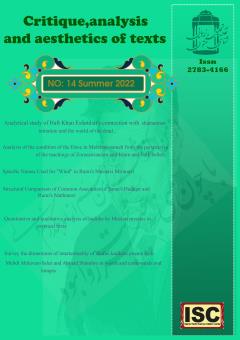Specific Names Used for "Wind" in Rumi's Masnavi Ma'anavi
Subject Areas : Analysis of order textsFarshad Eskandari Sharafi 1 , Hossein Sahragard 2
1 - M.A. of Persian Language and Literature, Persian Language and Literature Department, Faculty of Literature and Human Sciences, Razi University, Kermanshah, Iran.
2 - Ph.d of Persian Language and Literature, Arak University, Arak, Iran.
Keywords: Masnavi Ma'anavi, Rumi, special names of "Wind", semantic maps and functions,
Abstract :
Masnavi Manavi, as the most prominent mystical poetry work of Persian literature and among the most significant works of the Iraqi Style Period, has many Arabic words. The high frequency of Arabic words in this work suggests that the use of Arabic words is a stylistic component of Rumi's poetic language in Masnavi. Rumi, being aware of the semantic capacities of Arabic words, has used them to create and express various mystical and moral meanings, compensating for the lack of Persian equivalents for conveying his various and lofty ideas. "Wind" is one of the words of Masnavi, which has gained a high frequency through Rumi's special view of the elements of nature and their maximum use in creating mystical and moral meanings, and several specific names have been used for it. This study, by applying a descriptive-analytical method and using library sources, has explored the specific names of "Wind" in the six books of Masnavi Manavi. The results reveal that Rumi used 7 specific names for "Wind" in Masnavi, all of which being derived from Arabic. In terms of frequency, these names include Saba (18 times), "Sarsar" (12 times), "Nasim" (8 times), "Samum" (7 times), "Reeh" (6 times), "Dabour" (5 times) and Shamal (3 times). Each of these specific names of "Wind" in Masnavi has several secondary meanings, among which Saba with 13 and Shamal with 2 secondary meanings, have the most and the least semantic maps and functions in Masnavi.
استعلامی، محمد. (1387). متن و شرح مثنوی مولانا، ج 1؛ 2؛ 3؛ 4 و 6، چاپ نهم، تهران: سخن.
انوری، حسن. (1390). فرهنگ بزرگ سخن، ج 5، چاپ هفتم، تهران: سخن.
بهار، محمدتقی. (1390). سبک شناسی (تاریخ تطور نثر فارسی)، ج 1، چاپ چهارم، تهران: زوار.
پورنامداریان، تقی. (1388). گمشدۀ لب دریا (تأملی در معنا و صورت شعر حافظ)، تهران: سخن.
حافظ، شمسالدین محمد. (1392). دیوان غزلیات، به کوشش خلیل خطیب رهبر، چاپ پنجاه و دوم، تهران: صفی علیشاه.
دهخدا، علیاکبر. (1377). لغتنامۀ دهخدا، ج 7؛ 8؛ 9؛ 10 و 14، چاپ دوم، تهران: دانشگاه تهران.
زرینکوب، عبدالحسین. (1390). سرّ نی، نقد و شرح تحلیلی و تطبیقی مثنوی، ج 1، چاپ سیزدهم، تهران: علمی.
زمانی، کریم. (1391). شرح جامع مثنوی معنوی، ج 4، چاپ بیست و دوم، تهران: اطلاعات.
ـــــــــــ. (1391). شرح جامع مثنوی معنوی، ج 5، چاپ بیستم، تهران: اطلاعات.
ـــــــــــ. (1392). شرح جامع مثنوی معنوی، ج 1، چاپ چهل و دوم، تهران: اطلاعات.
ـــــــــــ. (1392). شرح جامع مثنوی معنوی، ج 2، چاپ سی و دوم، تهران: اطلاعات.
ـــــــــــ. (1392). شرح جامع مثنوی معنوی، ج 3، چاپ بیست و چهارم، تهران: اطلاعات.
ـــــــــــ. (1392). شرح جامع مثنوی معنوی، ج 6، چاپ بیست و یکم، تهران: اطلاعات.
شمیسا، سیروس. (1391). سبکشناسی شعر، ویراست 2، چاپ پنجم، تهران: میترا.
شهیدی، سید جعفر. (1386). شرح مثنوی، ج 8، چاپ چهارم، تهران: علمی و فرهنگی.
غلامرضایی، محمد. (1377). سبکشناسی شعر فارسی از رودکی تا شاملو، چاپ اول، تهران: جامی.
گوهرین، سید صادق. (1382). شرح اصطلاحات تصوف، جلد 7، تهران: زوار.
معین، محمد. (1388). فرهنگ فارسی، ج 2، چاپ بیست و پنجم، تهران: امیرکبیر.
مولوی، جلالالدین محمد بن محمد. (1376). مثنوی معنوی، تصحیح و پیشگفتار عبدالکریم سروش، 2 ج، چاپ دوم، تهران: علمی و فرهنگی.
ـــــــــــــــــــــــــــــــــــ. (1387). غزلیات شمس تبریز، مقدمه، گزینش و تفسیر محمدرضا شفیعی کدکنی، ج 1، چاپ چهارم، تهران: سخن.
نیکلسون، رینولد الین. (1389). شرح مثنوی مولوی، ترجمه و تعلیق: حسن لاهوتی، ج 3، چاپ چهارم، تهران: علمی و فرهنگی.


